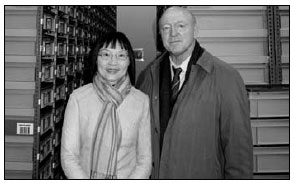 |
|
Amy Wu and her husband Hans Boller have fought a long battle to gain acceptance for TCM in Switzerland. |
"I like challenging situations," says Chinese-Swiss Amy Wu, 59, co-founder of ChinaMed Group, the leading provider of Chinese healthcare in Switzerland.
Wu and her husband Hans Boller set up the very first traditional Chinese medicine (TCM) center in 1997. Now, the couple owns 16 clinics in nearly all major cities across Switzerland, besides a 1,000-square-meter pharmacy near Zurich.
Every day, nearly 300 prescriptions from the nationwide clinics are e-mailed to the pharmacy and on average, Wu's doctors provide nearly 100,000 treatments every year in a country of just 7 million.
Wu and Boller have fought a long and hard battle to gain acceptance for TCM.
In 2005, the Swiss interior ministry rejected complementary therapies, including TCM, arguing they failed to meet the legal requirement of "scientific proof" of their efficacy.
The reversal in policy follows a nationwide vote in 2009 in which two-thirds of Swiss backed the inclusion of these therapies in the constitutional list of paid health services.
"This is a hard-won success," Wu says.
Now, two leading Swiss hospitals - the St. Anna and the Sonnenhof Klinik, both members of the Swiss Leading Hospital group - have TCM centers.
The couple attributes their success to the marrying of traditional Chinese culture with efficient Swiss management methods.
Wu, who was born in Hong Kong and studied culture and history in the United States and Britain, has long been interested in traditional Chinese culture.
Boller, 64, grew up in Switzerland and after completing his PhD studies at the University of Zurich in 1976, he moved to China for a two-year teaching stint at a Beijing-based university. He stayed on as China correspondent for several Swiss media operations until 1983.
The couple got to know one another when Boller visited the US in the 1970s and they got married in 1982.
TCM theory is based on Daoist and Confucian philosophical concepts of balance and unity of opposites (yin and yang). Illness is believed to result from an imbalance between interconnected organ systems.
"This is the overarching theory and for years, we have been promoting the fact that TCM is an essential part of Chinese culture," Boller says.
"By introducing the Swiss public to TCM we are making them a bit more familiar with China's cultural heritage."
Wu, who has been updating her knowledge of TCM in Chengdu in Southwest China and Nanjing in East China since 2000, says: "I can now communicate effectively with our doctors, and this is a big advantage of our company," she says.
Only the most qualified and experienced doctors with a minimum of 10 years hospital duty are considered for the Swiss TCM clinics. To date, more than 200 Chinese doctors have been recruited.
Li Pengyao is one of the newest in Zurich.
To bridge the communication gap, he is assisted by a translator. Li works in a clinic in downtown Zurich where acupuncture and massage are offered. Since his arrival, he has offered about 10 treatments every day.
The doctors are guided by the four classic diagnostic methods systematized in Chinese medical literature around the 4th century BC. These include observing the patient's color, appearance and tongue; listening to the patient; feeling the pulse to know its quality, power, rate and rhythm; and doing physical checks for any problems.
The doctors then decide whether the patient needs acupuncture, herbal medicine, massage, or dietary changes.
"A combination of these therapies is often used to effectively treat a patient," Li says.
The clinics get their medicines from the pharmacy near Zurich, prepared by a specialized staff of Swiss nationals.
"Usually our patients receive the medicine within 24 hours," Wu says.
(China Daily March 30, 2011)